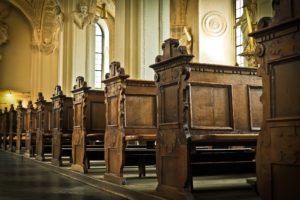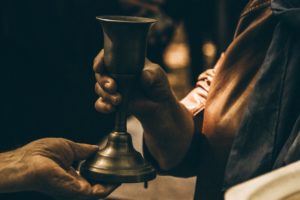One idea that I’ve heard several Catholics express is that the Catholic faith never changes. We belong to a faith with more than 2,000 years of history that follows tradition and beliefs set down hundreds of years ago, set in stone. It’s an idea that many seem to find comforting; that amongst today’s rampant uncertainty, the Catholic Church stands as a stalwart beacon of stability and constancy. Indeed, I have known Catholics who have translated this understanding into a strict no-change policy, used to block progress in their communities and parishes. The Catholic Church does not change. Period.
I have to admit that I find this perspective confusing. For the last four years I’ve been on a voyage of discovery vis-à-vis the Catholic faith. Technically raised in a Catholic family, I didn’t want much to do with the Church for most of my adult life. And then circumstances changed, and I found myself circling around for a closer look. It hit me that most of what I thought I knew about being Catholic was really little more than other people’s opinions (apparently speaking confidently is not the same as being informed), and that I hadn’t bothered to truly educate myself about being Catholic. The last four years have been busy: I’ve participated in RCIA (a process of Christian formation developed by the Catholic Church), I have partaken in Alpha and GoodNews programs, volunteered on a parish council, started reading the Bible, have sought out religious and historic works on the Church’s early history, organized Alpha and Prayer Courses, and was given permission to audit the Diaconate Program’s theology course. And after all that, I’ve had to conclude that the Catholic Church is anything but unchanging!
If anything, the Catholic faith seems to be defined by the opposite, by transformation, even all the way back to our very roots. Jesus transformed our understanding of God and our relationship with Him. How the church conducts itself has transformed substantially since its earliest days – the Church as described in the New Testament’s Acts and Letters is different than the Church at the time of the Nicene Council, which is different again than the Church in the Middle Ages, during the Renaissance, or in post-Vatican II Canada. The flavour of the Catholic faith is transformed depending on place and culture, with practices in Canada being different from those in Mexico, in Spain, in Ireland or the Philippines. Even how we conduct and understand the Mass has transformed over time, as anyone who remembers pre-Vatican II worship can attest. And transformation characterizes how we talk about our faith: encountering Jesus is said to transform us, indeed, setting us on a faith journey – and the best journeys are pretty much defined by change.
So what gives? Are the Catholics who insist that the faith doesn’t change completely mistaken, or have Catholics like me completely misinterpreted everything? Like so many mysteries within the Catholic faith, the church somehow manages to be both. To paraphrase Dr. Peter Baltutis, Associate Professor of History and Religious Studies and CWL Chair for Catholic Studies at St. Mary’s University in Calgary, while the Word of God remains essentially unchanged, our understanding of the Word of God deepens or transforms over time. As mere humans, we are not able to understand the totality of God and His Words (Isaiah 55:8-9). We are only capable of understanding the Word of God through the filter of context, the lenses of culture, place and time – and those, of course, change and evolve. This is why Jesus taught using allegories of mustard seeds, sheep, widows, lepers and tax collectors – all cultural symbols that would have had a lot of meaning for the Jewish people of His time, but that don’t have quite the same relevance to modern Canadians.
If Jesus was teaching today, He might instead have spoken about our people on the fringe, our “lepers and tax collectors” – e.g. inclusion of the homeless, of women and LGBTQ+ individuals, and may well have told allegories that used modern issues or symbols such as global warming or social media. This is why Catholics are encouraged to study the Bible and taught not to interpret it literally, an intentional nod to the Bible’s symbolism and allegory and the work needed to better understand and appreciate the Word of God. And this is why there’s a small army of academics and scholastics who work in fields like theology and liturgy, and who are constantly grappling with the Word of God as understood in the modern context. If the Catholic faith was simply set in stone, all of those people would be out of a job. In short, the Catholic faith is both constant and evolving or transforming.
And this is something that Catholics need to better understand. Our faith may be rooted in 2,000 years of history and tradition, but that is not the same as being unchanging. And yet the idea that the Catholic faith is written in stone and never changes seems to be a pervasive (and ultimately false) idea held by many Catholics. Faith is meant to touch us, to challenge us, to transform us – we are meant to be active participants in our faith, not passive consumers. Transformation is something Catholics should embrace, not be afraid of. The trimmings might be altered, our understanding might deepen and transform, but the core of it all is always unchanging: Jesus’ message of God’s eternal love. To lose sight of the faith’s transformative nature is to reduce something mysterious and beautiful to mere rules, static ideology or dogmatic formulations – a stance that Pope Francis himself warned Catholics against (General Audience, Oct 9/19).
Don’t settle for simply attending Mass each Sunday, and don’t let your faith get stagnant or your journey falter. Get involved! Volunteer in your parish, learn about the Mass by participating in it, and get to know the other people in your community. Seek out programs like Bible study groups, Alpha, GoodNews and The Prayer Course – and if they don’t exist in your parish, consider launching one. Explore programming available through places like Retreat Centres. Look for lectures and Catholic continuing education opportunities through your Diocese or nearby universities. Try something new, whether it’s going to a weekday Mass, attending a Charismatic Prayer session, trying Christian meditation, joining a rosary group, or participating in Eucharistic Adoration. Introduce yourself to a priest and have a conversation with him. Ask questions, seek answers. Don’t shy away from contradictions or whatever isn’t understood or agreed upon – that’s transformation just waiting to happen!
And the next time someone tells you that the Catholic faith is written in stone or uses that to justify excluding someone or blocking progress in your parish, call them out on it. Transformation and change is in many ways at the heart of the Catholic faith – embrace it.









